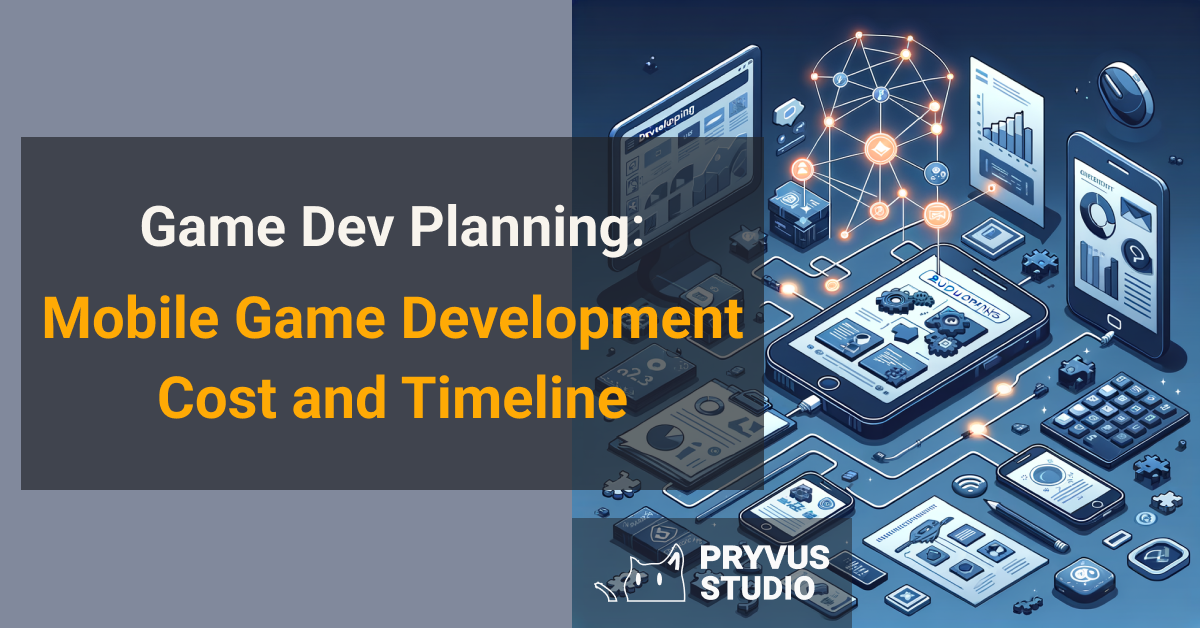Notice: Only variables should be passed by reference in /home/ploi/pryvus.com/public/wp-content/themes/pryvus/template-parts/content-post.php on line 12

Understanding mobile game development costs is crucial for any developer.
This article provides insights into managing these costs effectively, ensuring your project stays on budget and timeline. It offers a comprehensive overview of factors affecting development expenses and how to navigate them efficiently.
In this article, you will learn:
- Key components of mobile game development costs
- Strategies to minimize expenses and timelines
- Importance of choosing the right development partner
Understanding Mobile Game Development Costs
Embarking on the journey of mobile game development is thrilling. Yet, it’s filled with complexities, especially regarding costs and timelines. Let’s demystify this, shall we?
First off, there’s no one-size-fits-all answer. The cost and time to develop a mobile game can vary widely. Factors like game complexity, platform, and design intricacies play a huge role.
Game Complexity
Simple games, think Flappy Bird, might cost less and take a few months. Complex ones like an RPG could take years and a bigger budget.
Platform Choice
Developing for iOS, Android, or both? Each has its costs and considerations.
Design and Features
High-quality graphics and multiplayer features add to both cost and development time.
But hey, it’s not all daunting. Pryvus Studio, with its expertise in innovative solutions, can tailor the development process to your needs and budget. We’ve navigated these waters before, helping clients streamline processes and unlock new opportunities.
Understanding the breakdown of development costs is crucial. It typically includes:
- Game design and planning
- Asset creation (graphics, audio)
- Coding and development
- Testing and quality assurance
- Marketing and launch
Each phase impacts the overall cost and timeline. By knowing what to expect, you can plan better and make informed decisions.
Ready to dive deeper into what affects mobile game development costs and timelines? Stick around as we explore the key factors in the following sections.
Timeline for Developing a Mobile Game
Estimating the timeline for mobile game development is crucial for planning and budgeting. This phase involves several key stages, from concept to launch. The duration of each stage can vary significantly depending on the game’s complexity and the team’s expertise.
The timeline for developing a mobile game depends on its complexity and the development team’s expertise.

Initially, the conceptualization phase includes brainstorming ideas, defining the game’s goals, and drafting initial designs. This can take anywhere from a few weeks to a couple of months. Following this, the pre-production phase involves detailed planning, creating prototypes, and finalizing the game design. This stage is critical and can last from one to three months.
Entering the production phase, the team focuses on developing the game. This includes coding, creating assets, and integrating various game elements. Depending on the game’s complexity, this stage can span from six months to over a year. Subsequently, the testing and polishing phase ensures the game is bug-free and runs smoothly, which could add an additional two to four months to the timeline.
Lastly, the launch phase includes final adjustments, marketing efforts, and the game’s release. Post-launch, updates and maintenance are crucial for keeping players engaged. While smaller games may move quickly through these stages, complex projects with advanced graphics and multiplayer features can take significantly longer.
Choosing a partner like Pryvus Studio, experienced in navigating the complexities of mobile game development, can streamline these processes. Their expertise in project management and client collaboration ensures a smoother development journey, potentially reducing the timeline.
Key Factors Influencing Development Time and Costs
When diving into mobile game development, it’s crucial to understand the elements that shape the journey. These factors not only impact the cost but also the timeline of your project. Let’s unravel these key components.
The complexity of the game, choice of platform, and the team’s expertise significantly influence development time and costs.
Game Complexity: The more complex the game, the higher the cost and longer the development time. Simple games with basic mechanics can be developed quickly and at a lower cost. In contrast, games with intricate designs, advanced physics, or multiplayer features require more time and resources.
Platform Choice: Developing for multiple platforms (iOS, Android, web) increases development time and costs. Each platform may have unique requirements and necessitates additional testing and adaptation.
Team Expertise: A team’s experience in game development can drastically reduce time and cost. Experienced developers can anticipate challenges and efficiently manage resources.
Asset Creation: High-quality graphics, animations, and sound effects are crucial for engaging games but require significant time and investment. Custom assets are more expensive than stock options.
Testing and Polishing: Extensive testing is essential to ensure a bug-free, polished game. This stage can be time-consuming but is vital for the game’s success.
Marketing: Effective marketing campaigns are necessary to ensure your game reaches its audience. Budgeting for marketing is an important part of the project’s costs.
Understanding these factors will help in planning and executing your mobile game development project more effectively.
Choosing the Right Partner for Your Mobile Game Development
When embarking on the journey of mobile game development, selecting the right partner is crucial. This decision can make or break your project. The ideal partner brings not just technical expertise but also a deep understanding of the gaming market. They should align with your vision, budget, and timelines.
Choosing a development partner is a pivotal step in ensuring the success of your mobile game.

There are several aspects to consider when choosing your development partner:
- Experience: Look for a team with a proven track record in mobile game development. Their portfolio should reflect games similar in complexity and genre to your project.
- Technical Skills: Ensure the team is proficient in both native and cross-platform technologies. This versatility can be crucial for your game’s performance across different devices.
- Communication: A partner that maintains transparent and regular communication throughout the development process is essential. This ensures that you are always in the loop and that any issues are addressed promptly.
- Client Testimonials: Feedback from previous clients can provide valuable insights into the team’s reliability, quality of work, and ability to deliver on time.
- Cost: While cost should not be the sole deciding factor, it’s important to find a partner who offers a good balance between quality and affordability.
Pryvus Studio exemplifies these qualities, offering innovative solutions in mobile game development. Our client-centric approach and expertise in the latest technologies make us a preferred partner for businesses looking to create engaging and successful mobile games.
In summary, the right development partner not only has the technical skills but also shares your vision and values. They play a critical role in transforming your game idea into reality, within your budget and timeline constraints.
Reducing Costs and Timelines in Mobile Game Development
Creating a mobile game is an investment of time and money. Yet, savvy developers can find ways to streamline both. The goal? Efficient development without sacrificing quality. Let’s dive into strategies that trim costs and timelines.
Efficiency in mobile game development doesn’t mean cutting corners. It’s about smart planning and execution.
First, clearly define your game’s scope. A well-outlined project prevents scope creep, saving time and resources. Next, consider using game development platforms like Unity or Unreal Engine. These tools offer pre-built assets and functionalities, speeding up development.
Another tip is to adopt an agile development methodology. This approach allows for flexibility and faster iterations, leading to quicker adjustments and reduced development time.
Outsourcing can also be a game-changer. Partnering with specialized studios for certain tasks, such as artwork or coding, can reduce costs significantly. Plus, it allows your team to focus on core development tasks.
Finally, testing early and often is crucial. Identifying and fixing issues early in the development process prevents costly, time-consuming fixes later on.
By adopting these strategies, developers can reduce the cost and timeline of mobile game development without compromising on quality or player experience.
Getting the Most Out of Your Investment
Investing in mobile game development is both an exciting and daunting task. The key to success lies in understanding and managing development costs and timelines effectively. Here’s how you can maximize your investment:
- Choose the right development partner: A partner like Pryvus Studio, with proven expertise and a commitment to your vision, can make all the difference.
- Focus on efficient planning: Clear scope definition and agile methodologies streamline the process, saving time and money.
- Invest in quality: High-quality assets and thorough testing are non-negotiable for a successful game.
- Smart marketing: Effective marketing strategies ensure your game reaches its audience and achieves success.
Remember, the goal isn’t just to minimize costs but to maximize the value of your game. By focusing on efficiency, quality, and the right partnerships, you can achieve a successful launch without unnecessary expenditures.
Looking to turn your game idea into reality? Let’s talk! Pryvus Studio is here to guide you through every step of the mobile game development process. Reach out today to learn how we can help you get the most out of your investment.


